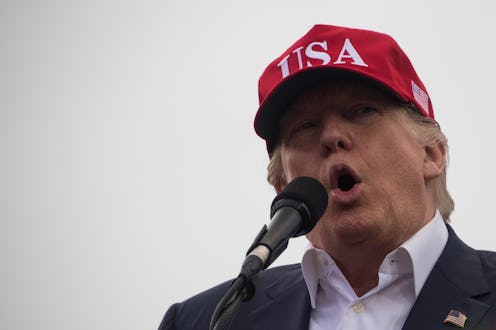News
How Russia Could Benefit From Trump's Presidency
President-elect Donald Trump continues to deny CIA intelligence that points to Russia's interference in the election that won Trump the White House in November — but he's not doing a very convincing job. The experts — as in, the CIA, the FBI, and current White House officials — all believe that Russia worked to get Trump elected, and over the weekend, even Saturday Night Live seemed to agree. If we're to believe the intelligence officers (and the intelligent comedians), then their theory begs the question: What does Russia want Trump to do as president?
The most basic answer points to loyalty: Russia seemingly wants an ally in the U.S. As a New York Times column put it on Saturday, Russia wants a "lap dog," or a "poodle." Vladimir Putin's relationship with the U.S. throughout the previous administration has been strained, at best. Meetings between the two current world leaders have largely been brief and impersonal. After a November encounter in Peru, President Obama said his conversation with Putin was "very clear about the strong differences that we have on policy."
It would make sense, then, that Putin and Russia would hope to secure a more agreeable U.S. leader for the next four years. In particular, an American ally could help with Russia's economy, which, according to Forbes, is struggling after falling oil prices worldwide. If it's economic resurgence through oil that Russia is after, then Trump may have already come through for Putin.
Last Tuesday, Trump announced that he would appoint Rex Tillerson, CEO of ExxonMobil, as secretary of state. Tillerson seems to check a big box for Russia, as the oil company executive has previously said that he has "a very close relationship" with Putin. "I have invested a lot of money, our company has invested a lot of money, in Russia very successfully," Tillerson said last February.
According to Time, Tillerson has previously called for the U.S. to lift its economic sanctions against Russia. (Reminder: The U.S. invoked sanctions against Russia after the Russian invasion of Ukraine in 2014.) In part, Tillerson's stance could make sense because sanctions likely interfered with some of the deals that he was trying to make with Russia as head of ExxonMobil. Interestingly enough, though, Tillerson will soon oversee the negotiation of any sanctions if he's confirmed as secretary of state.
With his new role, Tillerson would negotiate with countries around the world. But his approach to leading the State Department, coupled with Trump's approach to leading the entire executive branch, could mean a new kind of relationship between the U.S. and Russia. Ultimately, it could be the exact relationship that Russia is after.
